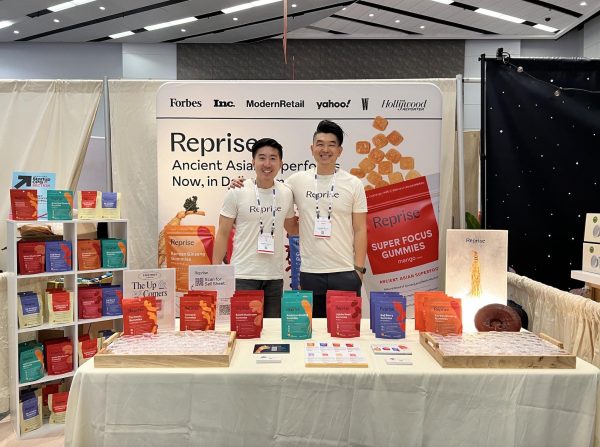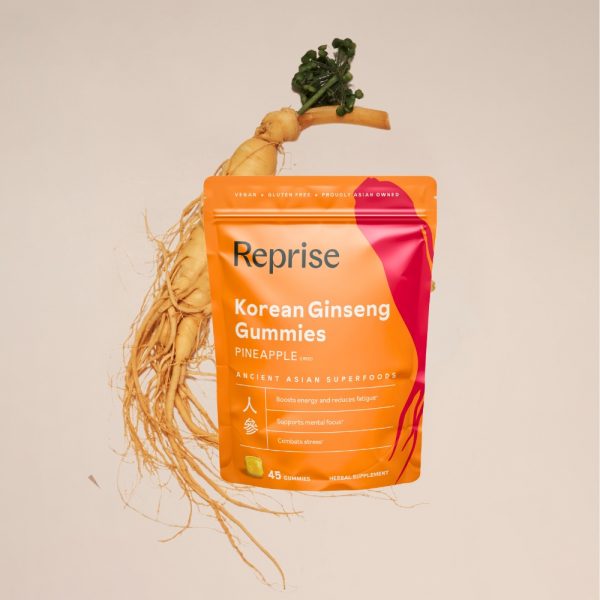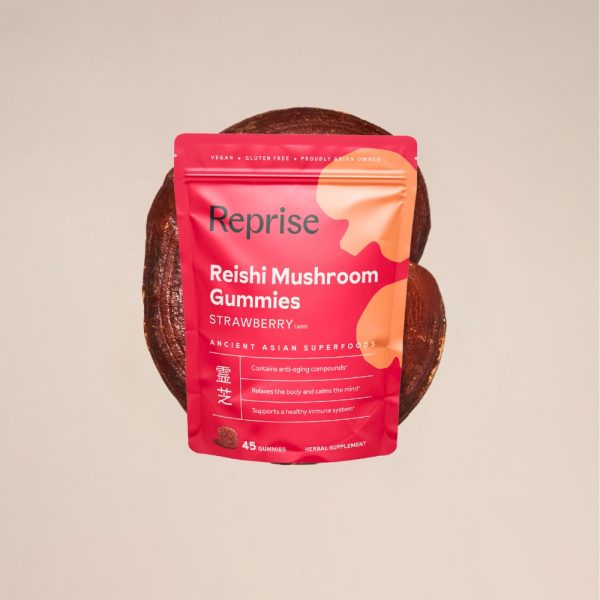Founder Friday Feature:
Kai Lim of Reprise

Meet Reprise: the brand transforming their Grandmother’s herbal practices into a modern CPG brand
Kai Lim and David Yu, the co-founders of Reprise, first met at Harvard Business School and graduated together in 2020. Given their timing, Kai says, “We had a lot time to reflect. David and I are both very interested in consumer health, so when we were thinking of potential startups we could work on, we began reflecting on our childhood health habits.”
As children, both Kai and David’s Grandmothers gave them traditional Eastern herbs for their health. Kai says, “It was part of the ancient practice of Traditional Chinese Medicine, which can be complex and hard to understand. It’s also hard to source quality herbs, which makes a huge difference.” The herbs themselves, Kai explains, are also not exactly appetizing. “When my grandma would give [them to me], I would try to avoid taking them‚ particularly ginseng or reishi mushroom, which, in their purest form, can be very bitter.” Kai and David lost touch with their Grandmothers’ herbal practices as adults, but as they began brainstorming a brand, they realized there was an opportunity within their shared childhood experiences: “How can we make traditional East Asian superfoods more accessible?” With this question in mind, they set out to simplify the ancient practice of Chinese Medicine into delicious, fruit-forward herbal gummies.
To develop Reprise, Kai and David incorporated “ancient knowledge and the modern consumer’s perspective.” Kai explains, “Unfortunately, a lot of this wisdom has been passed down through generations and proven to work, but not in the Western way — It hasn’t gone through human clinical trials. We had a team of scientific advisors from Harvard Medical School who were trained in both Eastern and Western medicine. They were great in helping us filter through the herbs to identify which were clinically backed.”
After countless conversations with their advisors, combing through 1000s of research articles, and considering the most common health needs of today’s consumer, Kai and David landed on a slate of herbs they felt confident launching: “We started with Korean ginseng, American ginseng, turmeric, goji berry, reishi mushroom, and jujube seed.” More recently, Kai says, Reprise “started creating herbal blend gummies, and we are in R&D for potentially five or ten more [products] that we haven’t launched yet.”

How have customers responded to Reprise?
“I’m sort of forcing a stereotype,” Kai says, “but there are two archetypes. One is customers who are familiar with these herbs. Most of the time that’s someone with a similar cultural background. For them, the education barrier is low and their objection is compliance. They say, ‘It’s hard for me to brew reishi or ginseng for hours’ Or, ‘It’s hard for me to find quality herbs…’ And like I said before, [the herbs] taste bitter. For these customers, it’s about encouraging them to try the gummy. When they taste it, they say, ‘I didn’t think [these herbs] could taste so good. I can actually take that every day.”
The other set of customers Kai sees most frequently are people who have never heard of these ancient herbs. “We’ll say, ‘Have you tried ginseng?’ And they’ll say, ‘Yes, I’m familiar with ginger.’ For those customers, it’s about education — explaining, this is what the herb looks like and this is what it has been used for. Often, they’ll end up trying them because it’s so easy [to take] a gummy. As they benefit from [Reprise] over time, they come back and say, ‘I love taking ginseng instead of coffee in the morning. Or I like taking reishi instead of melatonin to help me calm down before bed.”
The education barrier and operations woes
Speaking of customers who confuse ginseng for ginger, Kai explains that their biggest challenge in growing Reprise has been consumer education. He explains, “I’m from Singapore, so TCM [traditional Chinese medicine] is an acronym the whole country knows. Whereas in the US, if I say TCM, I think half of the people would be confused. So our big challenge is education and messaging. How do I message this brand so it’s accessible to most Americans? And how do I get that message across not just to consumers but also buyers and retailers? Do we lean into the ancient traditional eastern herbs? Or do we lean into the modern world with Asian superfoods? It’s something we’re continuously testing.”
Like their customers, Kai and David see themselves as students of this practice. “Our scientific team and our manufacturer are the experts and we are learning from them. Whatever we learn, we try to distill in a way that we can understand and is not too technical…For example, when you look at an herb like ginseng — the king of herbs in Asia — ginseng alone could be good for your energy, body, and immune health. We tried to distill it down to the top five functions [ginseng is] known for, and then we realized that five is still too many, so we distilled it down to three and then just to one. We’re always asking, ‘How do we get the message across so that consumers can retain the information?”
The second biggest challenge, Kai explains, is operations. Kai and David co-developed their gummies with KCP Herbs, a fifth-generation herb company based out of Taiwan. Kai explains, “They have very strict criteria, and up to 70% of herbs are rejected, either at the point of sourcing or after they do tests. This means that when we work with them, there is a pretty long lead time between the point of order and getting it into my warehouse. That’s a big challenge for a CPG company because as a startup, your demand will suddenly spike. We’ve run out of stock a few times, which puts tremendous pressure on me as the CEO. That’s something still we’re trying to optimize.”

Growing their reach and the future of Reprise
“When Reprise started, we were purely online,” Kai says. “We built an algorithm to recommend the right combination of herbal gummies, and we now have a strong subscriber base. But around Q2 of last year, we started getting more inbounds from interested buyers. Our first channel was with acupuncturist clinics and wellness spas. They reached out to us and said, ‘Hey, do you do wholesale?’ At the time we didn’t, but I just said, ‘Yes we do.’ We started selling to a few clinics and they were selling well, so we started considering physical retail more seriously. We started doing physical markets and activating local communities in New York…I began focusing on outreach and we got into Foxtrot market [and others] very quickly. So from inbounds of around 20 stores, we suddenly grew to 60 or 70 stores. Now, we’re all around Chicago, DC, Dallas, and New York. Because of this boost, we got a distributor. We started working with Pod Foods, who put us on the innovation track and is pitching us nationwide.”
“Within the next year, our focus is to solidify what we call channel market fit. For Reprise, which is a supplement, there’s a very interesting intersection across channels. We’re trying to figure out — Are we a brand that will be more digitally native? Or do we become a retail native brand? If you ask me today, I’m leaning more toward seeing us in physical stores. A big goal for me in the next year is getting us into more natural grocers and chains. Ideally, within a year, we can get to nationwide distribution. And within five years, I think that we will start to see more product expansion, and depending on where we’re at, I could even see a potential geographical extension. It’s never a straightforward path, but I think we’re on a good trajectory.”





All Comments